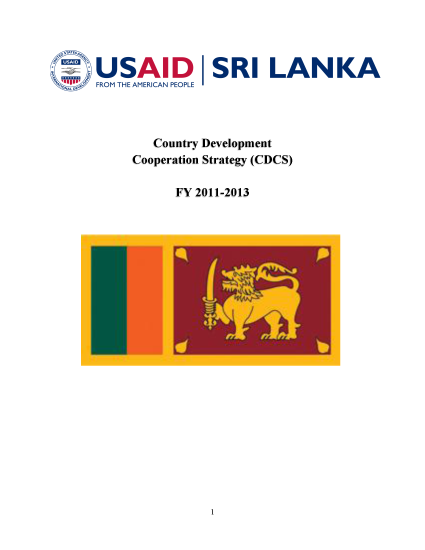Background: USAID/Sri Lanka’s CDCS addresses U.S. foreign policy goals of building and sustaining democratic, well governed states that respond to the needs of their people and reduce widespread poverty. USAID’s strategic framework as summarized on the following pages focuses on two Development Objectives (DOs) to support its overall Development Goal to accelerate reconciliation and economic growth equitably and sustainably.
Development Challenge: Sri Lanka is a country in transition. Its key challenge is to bring about social integration between the diverse ethnic groups in the North and East while protecting citizens’ rights and restoring effective and trusted governance in those parts of the country emerging from the conflict. Accelerated economic growth will increase livelihood opportunities, support productive local enterprises, and eliminate the need for humanitarian assistance to the most vulnerable populations.
Many economic and social development challenges remain unsolved or only partially addressed. USAID programs attempt to address the more pressing of these issues. This document outlines what USAID proposes to do to impact the more important enablers of social integration as identified in various assessments and interviews. These include justice, rule of law, and local governance and investment that encourages sustainable employment and creation of a skilled workforce in target areas. It is expected that USAID humanitarian assistance will phase down gradually, based upon on-the-ground realities.
USAID intends to advance the Development Goal through the following development objectives:
DO1: Strengthened Partnership between the State and its Citizens to Establish a Foundation for Reconciliation.
In support of efforts to create a unified and reconciled nation, USAID will, first, seek to improve the delivery of legal services and enhance the rule of law. Second, USAID will attempt to promote citizen participation in enhancing the delivery of public services. Third, USAID will support the stabilization of conflict-affected communities and the effective reintegration for victims of war.
DO2: Increased and More Equitable Economic Growth in Conflict Affected Areas.
To advance this goal, USAID will, first create public private alliances (PPAs) in order to attract investment to conflict-affected areas, thereby creating livelihood opportunities for vulnerable populations, These PPAs will be trained to advocate for regulatory reforms to improve the business environment. Second, USAID will enhance the workforce skills and productivity of enterprises will support regional economic development and improve economic opportunity.
The CDCS takes a balanced and integrated approach. The strategy supports short- and medium-term activities to assist families and communities to restore and rebuild in the North and East, while concurrently targeting longer-term initiatives to strengthen partnerships with the local government to give all communities a greater voice in Sri Lanka’s government and society.
To optimize foreign assistance funding, the CDCS contemplates an integrated approach that draws on intra-agency and interagency partnerships. USAID partners with the Department of Defense (DOD) (Pacific Command humanitarian assistance, Section 1207 funds, and Foreign Military Financing); Department of Justice (DOJ) (International Criminal Investigative Training Assistance Program); Department of State (DOS) (Bureau of Population, Refugees and Migration (PRM), International Narcotics and Law Enforcement Bureau, Bureau of Political-Military Affairs, Office of Weapons Removal and Abatement, Coordinator for Reconstruction and Stabilization, and U.S. Embassy); and USAID (Office of Transition Initiatives (OTI), Office of Foreign Disaster Assistance (OFDA), Special Programs to Address Needs of Survivors (SPANS), Development Grants Program (DGP), and Complex Crises Fund (CCF)).









Comment
Make a general inquiry or suggest an improvement.